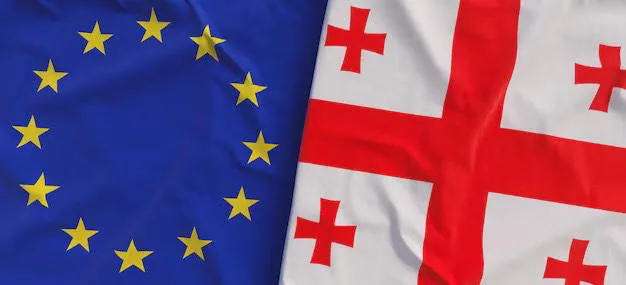
Georgia, situated in a complex geopolitical environment, has ample experience in its long struggle for freedom and self-determination, for values and dignity, especially as it gained independence from the last occupation by a neighbouring empire, 30 years ago. This started Georgia’s way to a free, democratic, prosperous and - not least - European future. Motivated by the overwhelming pro-European public support of the Georgian people, our countries – Germany, France and Poland as well as Belgium, Czechia, Denmark, Estonia, Finland, Latvia, Lithuania, Luxembourg, Portugal and Sweden – have been strong supporters of Georgia on this path from the very beginning and now share their concern and call for ensuring that the upcoming elections are free and fair. The Georgian people have achieved a lot in the past decades – Georgia’s application for EU membership in March 2022 being a historic milestone on this path.
All the more serious is, therefore, our current concern. It is our worry about the European future of Georgia, which makes us write these lines. As friends of Georgia and as Ministers for European Affairs of our countries, we feel the necessity to recall the EU’s position on Georgia and to correct misperceptions and intended mischaracterisations concerning Georgia’s European aspirations.
Georgia was granted candidate status in December 2023, on the understanding that Georgian authorities take the relevant steps as set out in a recommendation of the European Commission. Over the past months, Georgia has adopted a number of laws which are not compatible with the EU’s acquis – in particular, the so-called “Law on Transparency of Foreign Influence”. Due to those decisions, the EU integration process of your country has been put on hold. It will remain so, as long as the present political course continues. This is exactly what the European Council – representing the Heads of State and Government of the 27 EU Member States – concluded on 27 June 2024: the developments in Georgia led to a de facto halt of Georgia’s accession process to the European Union. Thus, it must be clear: Georgia will not be in a position to become a member of the EU if Georgian authorities do not change course. Toning down or interpreting this clear decision in any other way is either delusional or outright deceitful.
This was not an easy decision for the European Union to take: it was preceded by months of attempts at earnest engagement and discussion. To no avail so far. It is important to understand that the EU is not – only – an economic, trade, security or social union. Rather, the EU is a family of nations sharing the same values and a common willingness to defend these values. It is also, no less importantly, a legal union, sharing a body of law. Thus, it is only logical that the EU makes acceptance of European values and implementation of its legal norms a precondition for joining.
The so-called “Law on Transparency of Foreign Influence” is not in line with EU core norms and values both in spirit and content. It undermines the fundamental rights of Georgian citizens which are at the core of Georgia’s commitments as part of the EU accession path. The law was rushed through the Georgian Parliament, despite weeks of popular protest, a veto by the President and unambiguous criticism from Georgia’s partners. Unfortunately, additional laws incompatible with the EU and the Council of Europe enacted in the past months, especially the legislative package restricting rights of LGBTQI people, further derail Georgia from the EU path.
At the same time, some Georgian politicians have resorted to an unprecedented campaign of propaganda, disinformation, plain lies and defamation against its Western partners. The EU’s and its Member States’ representatives have been insulted, baselessly accused of coup and assassination plans against Georgian Government officials, of sinister motives to drag Georgia into wars, of “liberal fascism” and more.
Let us be clear: We are eager to welcome you in our European family as a member of the EU. Georgia is a European, pluralistic and democratic country, with a multi-faceted political scene, a vibrant civil society, a diverse media landscape and Georgia has been granted candidate status in 2023. The door is open and will remain so. This is why the European Council reiterated its steadfast solidarity with the Georgian people and its readiness to continue supporting Georgians on their path towards a European future.
Let us also be clear: We expect the Georgian authorities to guarantee free and fair elections. Georgians must be able to choose what future they wish for themselves, for their children and for their children’s children. We hope it will be a choice for Georgia’s European future. The choice is yours. Georgia’s future is in your hands.
Hadja LAHBIB
Minister for Foreign Affairs, European Affairs, Foreign Trade and Federal Cultural Institutions, Belgium
Martin DVOŘÁK
Minister for European Affairs, Czechia
Anna LÜHRMANN
Minister of State for Europe and Climate, Germany
Marie BJERRE
Minister for European Affairs, Denmark
Margus TSAHKNA
Minister for Foreign Affairs, Estonia
Joakim STRAND
Minister for European Affairs and Ownership Steering, Finland
Benjamin HADDAD
Minister Delegate for European Affairs, France
Baiba BRAŽE
Minister for Foreign Affairs, Latvia
Simonas ŠATŪNAS
Vice-Minister of Foreign Affairs in charge for European Affairs, Lithuania
Xavier BETTEL
Minister for Foreign Affairs, Foreign Trade, Development Cooperation and Humanitarian Affairs, Luxembourg
Adam SZŁAPKA
Minister for the European Union, Poland
Inês DOMINGOS
State Secretary for European Affairs, Portugal
Jessica ROSENCRANTZ
Minister for EU Affairs, Sweden
v-if="article.gallery" v-html="article.gallery"
(adsbygoogle = window.adsbygoogle || []).push({});